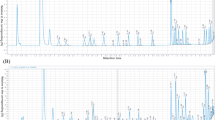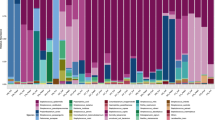Abstract
CONTINUING our research on lysozymes from different origins1, we were interested in the purification of a human lysozyme. Some preliminary experiments have indicated that human placenta, saliva and spleen contain lysozymes, approximately 4, 10 and 40 mgm./kgm. respectively (quantities expressed in mgm. of hen's egg white lysozyme). In contrast with cow's milk, we have found that human milk contains a lysozyme (40 mgm./l. expressed in mgm. of hen's egg white lysozyme).
This is a preview of subscription content, access via your institution
Access options
Subscribe to this journal
Receive 51 print issues and online access
$199.00 per year
only $3.90 per issue
Buy this article
- Purchase on Springer Link
- Instant access to full article PDF
Prices may be subject to local taxes which are calculated during checkout
Similar content being viewed by others
References
Jollès, P., The Enzymes, 4, 431 (Academic Press New York, 1960).
Jollès, P., Methods in Enzymology, 5, 137 (Academic Press, New York, 1961).
Author information
Authors and Affiliations
Rights and permissions
About this article
Cite this article
JOLLÈS, P., JOLLÈS, J. Lysozyme from Human Milk. Nature 192, 1187–1188 (1961). https://doi.org/10.1038/1921187b0
Issue Date:
DOI: https://doi.org/10.1038/1921187b0
This article is cited by
-
Immune Components of Colostrum and Milk—A Historical Perspective
Journal of Mammary Gland Biology and Neoplasia (2007)
-
Magnetic biospecific affinity adsorbents for lysozyme isolation
Biotechnology Techniques (1991)
-
Casein, a prohormone with an immunomodulating role for the newborn?
Experientia (1988)
-
Anti infective properties of breast milk
The Indian Journal of Pediatrics (1984)
-
The influence of lysozyme on the appearance of epiphyseal cartilage in organ culture
Calcified Tissue Research (1968)
Comments
By submitting a comment you agree to abide by our Terms and Community Guidelines. If you find something abusive or that does not comply with our terms or guidelines please flag it as inappropriate.



